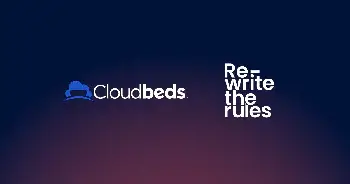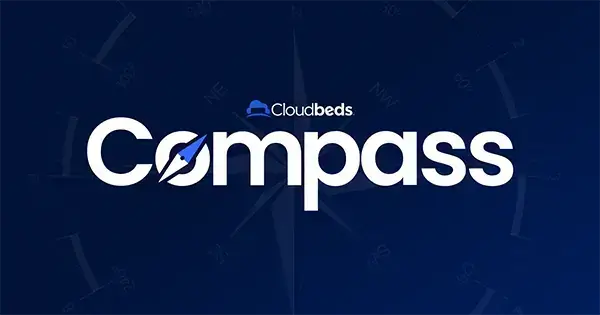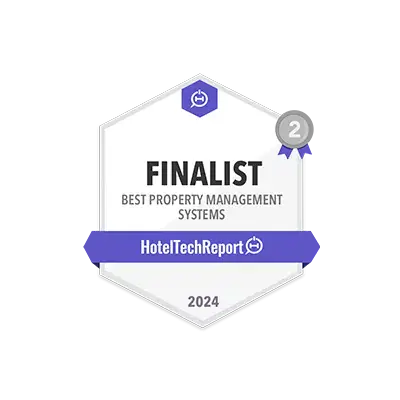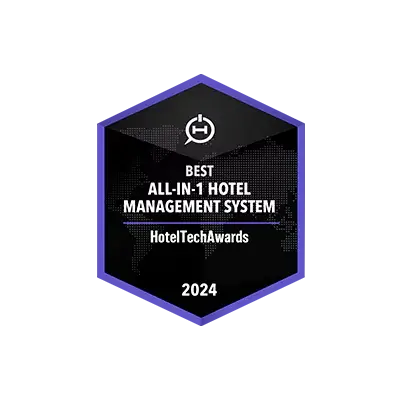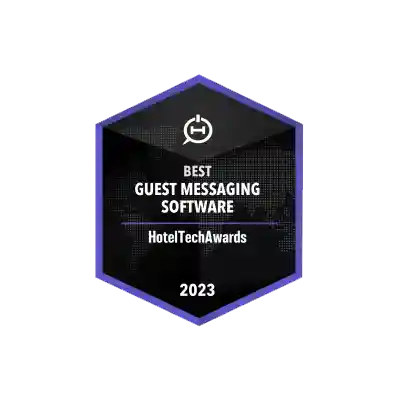Guest messaging: What is it,
why it matters, and 9 best practices
From texting and WhatsApp to Messenger and chatbots, there are dozens of communication channels to be leveraged by lodging businesses.
Some hoteliers have been resistant to adopt alternative messaging channels due to fears of repercussions of reduced in-person interactions. In reality, the use of messaging channels has actually served as an opportunity for increased personalization and connection between hotels and guests.
Guest messaging tools have played a pivotal role in facilitating these digital interactions and have helped lodging operators deliver a more seamless guest experience.
Read on to learn more about the benefits of hotel guest messaging, the technology available today, and 9 best practices for improving your guest experience through real-time communication.
Guest messaging is the practice of communicating with guests throughout the traveler’s journey to provide helpful and personalized information. Today, 70% of travelers prefer to communicate with hotels via digital channels such as live chat, Whatsapp, SMS, and Facebook Messenger. Properties that leverage guest messaging as part of their communication strategy can engage with guests in ways that are meaningful to them. Different demographics and personas prefer different forms of communication; therefore, it’s important as a hotelier first to define your target audience and determine what form of guest messaging most applies to them. What is guest messaging?
How should hotels communicate with guests?
You may be wondering — how should hotels communicate with guests?
The answer to this question depends on the hotel’s guest messaging tool. Some hotels opt for a more robust platform to ensure they can communicate with guests in their preferred mode across multiple touchpoints, while others use a single platform, such as Facebook Messenger or WhatsApp for Business.
Ivo Salmre, VP of Product at Cloudbeds, shares a recent experience he had as a guest at The Pearl in San Diego.
Guest messaging software (GMS) allows hoteliers and their employees to engage with guests one-on-one, enhancing personalization, efficiency, and well-timed communication. They utilize triggers and workflows to automate processes and implement dynamic and personalized information for each guest interaction. GMS helps staff members engage with guests in different ways to increase the likelihood of contact. With GMS, hoteliers can develop a comprehensive communication strategy to connect with guests throughout their journey, from live chat during booking to pre-arrival texts and post-stay surveys. What is guest messaging software?
Many GMS integrate with a property’s property management system (PMS) so that front desk staff can track guest requests and automate workflows. For example, a hotel could send guests a pre-arrival digital registration form to collect information for check-in. Once filled out, this information is automatically loaded into the PMS to make arrivals seamless.
With GMS, hotels can pick and choose when to send automated messages to guests to reduce the burden on staff while also increasing guest engagement and overall customer satisfaction scores.
Popular use cases for guest communication include:
- Utilizing artificial intelligence to answer potential guest questions on your website via chatbot or messenger
- Sending a pre-arrival registration card, including passport details, for frictionless check-in
- Sending arrival upsell opportunities such as a room upgrade or bottle of champagne
- Providing a link to a digital concierge to supply a map of the property, the wifi password, and local attractions and restaurants
- Conducting a mid-stay check-in to identify areas of service recovery
- Providing a support number that hotel guests can text or message for housekeeping or maintenance-related issues
- Sending a post-stay survey to gauge satisfaction and forward review links to satisfied guests
The opportunities to communicate with guests are limitless and becoming increasingly important in guest satisfaction. Hotel staff can leverage guest messaging tools to help streamline operations to deliver a more seamless experience.
How do hotels keep track of messages?
With more channels, the obvious question many hoteliers ask is — how can my team possibly keep track of all the messages sent?
There are a few ways that messages can be organized and dealt with using guest messaging solutions, including:
Unified inbox.
Many GMS consolidate messages from various platforms, including online travel agencies (OTAs), Facebook Messenger, WhatsApp, and SMS, so that hotel staff can easily respond from one spot. Teams can set up automated responses to quickly respond to commonly asked questions.
During Passport 2024, Jonathan Rojas, Director of Customer Growth, showcased Whistle for Cloudbeds’ unified inbox and messaging capabilities.
Staff ticketing and workflow management.
Based on the guest’s request, a workflow will be triggered, and notifications can be sent to the correct department, where a ticket is created. From here, tickets are assigned to individual staff members who can participate in two-way communication with the guest who made the request.
For example, if a guest sends a text message to the hotel stating that their shower is broken, the message will be routed to the maintenance department, where a ticket is created and a maintenance staff member is assigned. From here, they can send a response that they are on it and schedule a convenient time to fix the issue.
AI-powered responses.
For more basic questions, you can utilize AI to decipher the question and provide an applicable answer without ever having to go through an employee. This helps to streamline hotel operations and helps front desk staff save time.
For example, a potential guest may use a hotel’s live chat on their website to ask about on-site parking or a cancellation policy and receive an immediate answer from an AI bot rather than dial a phone number and have to wait for a reply.
3 types of guest messaging tools for businesses
Dozens of digital communication methods exist today. These three guest messaging tools are the most popular for businesses to leverage to engage with guests.
Messenger for Business
The three most popular messaging apps today are WhatsApp, Facebook Messenger, and WeChat. These platforms have business messaging platforms to help facilitate conversations with consumers. Studies show that guests prefer to use messaging apps when their needs are not urgent, so hoteliers should be wary of using this as their only form of communication.
Chatbots
Chatbots are applications that can respond intelligently to human interactions, eliminating the need for employee intervention. Chatbots are a great tool for properties to use on their website as they provide 24/7/365 customer service and are efficient at responding to questions and providing further information.
Depending on what chatbot you decide to use, you can pre-program your bot based on specific rules (ie. If a guest is on your website looking at room types, you can trigger your chatbot to ask if they have any questions). Otherwise, you can utilize AI to interpret guest communication and respond naturally. This route provides a more personalized experience, and often, potential guests mistake bots for real people.
Guest messaging platforms
Lastly, the most robust option hoteliers can choose is a guest messaging platform. These are centralized systems where you can send/receive messages from various channels, including chatbots and messenger for business, and manage everything through a single dashboard and one unified inbox. For example, whether a guest is messaging the front desk via WhatsApp or SMS, the staff member would receive the message in one inbox and be able to respond instantly from within the guest messaging platform.
Messaging platforms are best for properties looking to develop a comprehensive communication strategy that follows the guest journey from pre-booking to post-stay. Independent hotels can benefit from messaging platforms as they reduce the number of employees needed to deliver personalized guest experiences.
Messaging platforms don’t only help hoteliers improve their relationships with guests but also offer opportunities for additional revenue through upsells, add-ons, and special promotions – perfectly timed to be delivered at the right moment in the guest journey.
Also, guest messaging platforms can be used to automate requests for guest feedback to help catch and fix a bad experience while the guest is still on the property and also capture more reviews from satisfied guests by sending automated review requests.
Why is guest messaging important?
While the shift to guest messaging may seem like the obvious choice due to increasing labor shortages and our growing reliance on technology, the real value of guest messaging is the ability to form deeper connections with guests and deliver exceptional experiences throughout their entire journey. With guest messaging, you can provide support, give suggestions, connect with travelers, and foster relationships that lead to life-long return guests.
Understanding the path people take when planning a trip right through to the post-stay experience can help inspire your communication strategy supported by guest messaging solutions. Remember to make your touchpoints meaningful and incorporate as much personalization as possible to deliver the most value.
An added benefit and reward to meaningful guest communication is the increase in revenue through upsell opportunities, better online reviews, and loyal guests who will recommend your property to their network and friends and return again themselves.
Trends in guest messaging
Exciting trends have emerged within the guest messaging space that are changing the hospitality industry as we know it. These trends include:
Conversational commerce
To capitalize on guest purchase intent, hoteliers can implement conversational commerce using messaging platforms to create upsell campaigns, special offers, and prompt add-ons. This trend is mutually beneficial for properties and guests as it provides personalized options to enhance a stay, resulting in higher satisfaction for the guest and added revenue for the property. Properties with a GMS that have an integration with their PMS can facilitate the entire communication and upsell process from upselling to folio, all through a single system.
An example of conversational commerce would be creating a personalized campaign for couples, where you offer special add-ons like a bottle of champagne on arrival, a couple’s massage at the spa, or a room service dinner for two. You would then have an automated pre-arrival message sent via SMS or messenger with a link to the add-on options.
Automation
Consumers today expect instant access to information and have become accustomed to getting immediate answers. AI-powered messaging is the solution for hoteliers to reduce the burden on staff while delivering the information travelers need.
Hoteliers can set up answers to frequently asked questions in the backend and automate responses over chatbots or other messaging channels. For example, common questions like when is check-in, how late is the pool open, or where do I park, can all be automatically answered using AI responses.
Digitized check-in
It’s no surprise that mobile or digital check-in has increased by 66% since the pandemic. Since then, guests have become accustomed to the flexibility and convenience of submitting their information before arrival. Front desk staff are in support as well as it streamlines the check-in process, allowing them to spend more time on other guest-oriented tasks, like creating personalized welcome experiences.
Mobile usage & preference for digital communication
A recent survey divided evenly among Gen-Z, Millennials, Gen-X, and Baby Boomers found that text messaging is the most preferred form of communication while traveling. Consumers value the convenience of digital communication and expect that simple tasks such as making a reservation, checking into a hotel, or ordering room service can be done digitally through text or mobile app. It was found that younger consumers are more open to receiving digital offers through text, providing a great opportunity for hoteliers.
Benefits of guest messaging solutions and platforms
GMS is quickly being adopted by properties worldwide and is delivering both short and long-term benefits, including:
Increased guest engagement
It’s almost impossible to connect with each and every guest throughout their stay without the use of guest messaging platforms. By using software, hoteliers can proactively engage with guests to better understand areas of service recovery and their wants/needs to deliver exceptional experiences.
Higher guest satisfaction
It’s been found that companies that use messaging achieve a 2.9x greater annual increase in NPS (Net Promoter Score) compared to all others. By being able to address issues in real time, hoteliers increase the likelihood of positive in-stay experiences (that can be measured using automated surveys sent through the GMS) and positive reviews online. In addition, the efficiencies saved through guest messaging allow guests to spend more time enjoying their holiday and less time standing in line, which leads to higher reviews.
Additional operational insight
GMS with survey functionality can be used to gather feedback from guests to help glean operational insights. This information can be relayed through your GMS to the right departments to create service requests and work orders. This process provides more seamless coordination across departments which leads to operational efficiencies.
Improved team communication
GMS offers team messaging functionality to improve communication and efficiency across teams and departments. Here, staff can post daily bulletins or dispatch tasks using integrated staff ticketing.
New revenue sources
With GMS, you can implement personalized upselling campaigns and conversational commerce through SMS and messaging apps to bring in new sources of revenue. Easily offer room upgrades, late check-outs, spa services, and more.
More reviews (with higher ratings!)
GMS often has integrations with top review sites like Tripadvisor and Google Hotels to automatically send review links to satisfied guests.
Guest messaging challenges, costs, and ROI
To understand whether or not a guest messaging platform is a worthwhile investment for your property, we’ve helped to break down the challenges, costs, and return on investment (ROI) that can be expected.
Challenges
- Time to develop a comprehensive communication strategy and train staff to ensure guests are engaged throughout their journey at relevant touchpoints
- Understanding what forms of communication are most applicable to your target audience
- Making sure the guest messaging platform can integrate with your PMS for the most seamless experience for your staff and your guests.
Costs
- Implementation fee and monthly SaaS subscription if using a guest messaging platform (varies depending on provider, features, etc.)
- Additional technology and integrations to streamline processes, such as keyless entry
- Hours of on-the-job training for staff to be fully onboarded.
Return on investment
- Research shows that engaged guests spend 46% more annually than actively disengaged guests.
- Customers who use Live Chat prior to making a purchase have a 40% increase in conversions.
- According to a Cornell University study, hotels that increase their review scores by 1 point can increase prices by 11%.
12 leading guest messaging software providers
The following are 12 of the best guest messaging software providers that offer comprehensive functionality and receive high ratings on platforms such as Softwareadvice, HotelTechReport, Capterra, and TrustPilot.
Whistle for Cloudbeds
This top-rated guest messaging platform can integrate with your cloud-based PMS and allows hotels and guests to communicate via messaging apps, video, and webchat from pre-arrival through post-stay. Whistle for Cloudbeds helps engage guests at every stage of the guest journey and has helped properties achieve 24% more service recovery opportunities.
Akia
The Akia messaging platform enables hotels to streamline operations, facilitate contactless check-in, and provide two-way communication with guests and staff.
Chekin
Chekin helps hosts automate the entire check-in process from the booking confirmation till the check-out. Allowing to save time, money and comply with the legal requirements by managing everything online: guests registration and identification, data sending to authorities, rental agreements and digital signature, damage protection, upselling, tourist taxes, online payments, remote access and much more.
Duve
Duve is a holistic guest management platform that includes contactless check-in, a multi-channel communication hub, and more to help hotels boost revenue.
GuestHub
Guesthub is a Guest Experience Management System that enhances the interaction between your guests and internal staff, improving efficiency, accountability, and traceability of every request made.
GuestTalk
GuestTalk creates an instant and direct connection between guests and properties, allowing them to send requests via smartphone and properties to promote their services directly to guests.
GuestTouch
GuestTouch allows you to interact with your guests through familiar messaging channels and provide custom experiences that drive more sales and quality reviews.
HelloShift
HelloShift powers your digital hotel with guest messaging, contactless check-in, staff collaboration, housekeeping, and more.
HiJiffy
HiJiffy offers a guest communication hub powered by conversational AI that empowers hoteliers to enhance direct bookings, automate tasks, upsell effectively, and deliver instant multilingual responses.
Operto
Operto is a smart device tool that helps hotels manage keyless entry without needing a phone app. It also includes noise, and occupancy monitoring, smart energy controls, and more.
Runnr.ai
Runnr.ai is a virtual hotel concierge platform that enhances guest experiences by automating communication via WhatsApp, reducing front desk workload and increasing revenue through personalized interactions.
Visito
Visito uses AI for enhanced guest communication in hospitality, offering an all-in-one messaging solution integrated with booking software.
Cloudbeds has deep integrations with a range of guest experience and communication platforms, enabling lodging businesses to connect to the provider of their choice.
9 best practices for improving the guest experience
Ready to unveil the opportunities that guest messaging can bring your property? Review these best practices for improving the guest experience with real-time communication.
1) Don’t use a one-size-fits-all approach to guest messaging. Ensure that you’re using guest messaging to understand your specific guests’ expectations and needs to drive relevant actions.
2) Ensure your guest messaging platform integrates with your PMS to provide a more seamless and elevated experience through automation.
3) Schedule and automate applicable messages to reduce the workload on staff and increase efficiencies property-wide.
4) Gather real-time analytics to understand how your guests feel while still at your property. Send a text midway through the guest’s stay to make sure their experience is meeting expectations. If it’s not, conduct appropriate service recovery.
5) Offer multiple communication channels to interact with guests in their preferred mode of communication. Determine who your target personas are and ensure that you have the technology in place that they value.
6) Utilize live chat on your website to help travelers find the information they need in real-time in order to increase direct bookings.
7) Implement digital registration cards to collect guest information before arrival to speed up the check-in process.
8) On the day of arrival, automatically send guests important information regarding parking, check-in times, and transportation details.
9) Send post-stay surveys to collect feedback from guests. By sending surveys, you can become aware of bad experiences and work with the guest to fix the issue before it becomes a bad review.
How The Pad uses guest messaging
When Lynne and Rob Baer first started conceptualizing and building their hybrid property, The Pad, they knew that technology would play a big part in their business. Whistle, a leading guest engagement platform, is being used across their property in conjunction with the Cloudbeds PMS to improve communication and automate pre-arrival guest registration to streamline the check-in process.
Kevin Bowen, Director of Operations at The Pad, said that Whistle has “been a big help to both our staff and guests in terms of increasing and improving communication between parties to make things more seamless.”

Just 8 months into operation, The Pad has already seen rave reviews from guests. They currently hold a 95% review rate with over 1,000 reviews.
They plan to continue adopting more of Whistle’s functionality to build more meaningful touchpoints across the guest journey.

